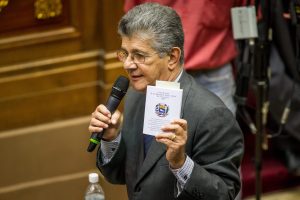Caracas, Jan 9 (EFE).- The Venezuelan National Assembly, where the political opposition holds sway, on Monday declared President Nicolas Maduro to have “abandoned his post” and demanded new elections as a way out of the country’s political crisis so that “it may be the people who express themselves with their votes.”

“The only way to resolve the serious problems besetting the country is to return power to the people of Venezuela and … (convene) … free and plural elections,” the legislature declared in an agreement that received the votes of 106 opposition lawmakers.
A majority of lawmakers in the chamber feel that Maduro’s exercise of his office is at the margin of the constitutional duties of the presidency and they blame him for the “serious rupture of the constitutional order,” for violating human rights and for the “devastation of the economic and social bases” of the nation.
According to the Venezuelan Constitution, the president’s absolute failure to fulfill his duties could be caused by his death or resignation, if he were to be removed by the country’s Supreme Court, his physical or mental incapacity, the popular revocation of his mandate or “the abandonment of his post, as declared by the National Assembly.”
If one of these circumstances were to occur, the Constitution obliges Venezuelan authorities to hold national, direct and secret elections.
The Constitution also establishes that the president “is responsible for his actions and the fulfillment of the obligations inherent in his office” and that “he is obliged to … guarantee the rights and freedoms of Venezuelans.”
Among the reasons given by the congressional opposition for declaring that Maduro had abandoned his office is that he has failed to carry out the “inherent” duties of the presidency by failing to “fulfill” the constitutional order by, among other things, suppressing “the separation of powers … via his support for the partisan occupation of the Supreme Court and the National Electoral Council.”
Thus, the parliament blames Maduro for implementing a “coup d’etat,” “deferring” the holding of regional elections that should have come about in 2016 and being negligent in recovering the territory of Essequibo, also claimed by Guyana, and failing to find a peaceful settlement to that dispute.
The opposition lawmakers also accused him of carrying out and, in fact, increasing “political persecution” of opponents.
